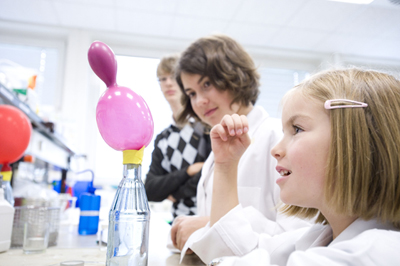Studying smallest living organisms, making the lecture hall quiver, travelling virtual worlds, and finding out about the Big Bang: These and many other topics make up the program of the seventh Karlsruhe Children’s University. The series of presentations for children aged from eight to twelve will take place from August 10 to September 3. Entrance tickets for the presentations can now be purchased in advance.
Every Tuesday and Thursday from 10 to 10.45 hrs, KIT scientists will take the children on exploration trips: In presentations with experiments, films, and quizzes, they will offer nature and engineering for all senses.
Microbes, the refuse disposal service in our body, will be in the focus of the first presentation held by Professor Ursula Obst on Tuesday, August 11. Two days later, the children, together with Dr. Joachim Ritter, will make the lecture hall quiver: To test a seismometer, by means of which scientists measure the magnitude of earthquakes.
A highlight will be the presentation on the premises of the Forschungszentrum on Tuesday, August 25: Here, the little students will first be told how fuel can be produced from straw. Then, they will visit the bioliq test facility together with the scientists. This facility was selected as a special venue by the initiative of “Land der Ideen” (land of ideas). During the bilingual presentation on Tuesday, September 1, pupils from Germany and France will go together on an “Expedition into the Microworld – Expédition dans le micro-monde”. After the final presentation on Tuesday, September 3, the Children’s University will say goodbye to its students by celebrating a diploma party. Among others, certificates and awards will be handed over to the busiest students.
Fifteen Workshops
First-hand experience of science will be offered at the laboratories: In workshops focusing on water, radioactivity, chemistry, mechanics, and many more topics. As architects, the young researchers can test their skills in model-making and as young journalists, the children may report about the Children’s University.
Ticket Sales and Registrations
Tickets for the presentations and the diploma party can be obtained at EUR 1 from the offices of the Badische Neueste Nachrichten, from BuchKaiser on Kaiserstraße as well as from Thalia (Kaiserstraße and ECE-Center). For the workshops, registration is required: Via an online form under www.kit.edu/kinderuni on the internet. Participation in the workshops will cost EUR 3. The KIT Public Relations and Marketing Department is responsible for setting up the program of the Children’s University. For further information and the complete program, see www.kit.edu/kinderuni.
Topics Covered by the Presentations and Lecturers:
Tuesday, August 11: Professor Ursula Obst,
“Small, but Beautiful or Bitchy – Microbes Are Everywhere”
Thursday, August 13: Dr. Joachim Ritter,
“How Do Earthquakes Develop?”
Tuesday, August 18: Professor Jivka Ovtcharova,
“Travelling Virtual Worlds”
Thursday, August 20: Professor Jürg Leuthold
“Phone Calls with Light”
Tuesday, August 25: Dr. Nicolaus Dahmen,
“Fuel from Farms”
Thursday, August 27: Professor Wim de Boer,
“How Loud Was the Big Bang?”, Presentation in German and French
Tuesday, September 1: Dr. Mathias Heckele,
“Expedition into the Microworld – Expédition dans le micro-monde”, German-French presentation
Thursday, September 3: Professor Hermann Schwameder,
“How Do Our Muscles Work?”

